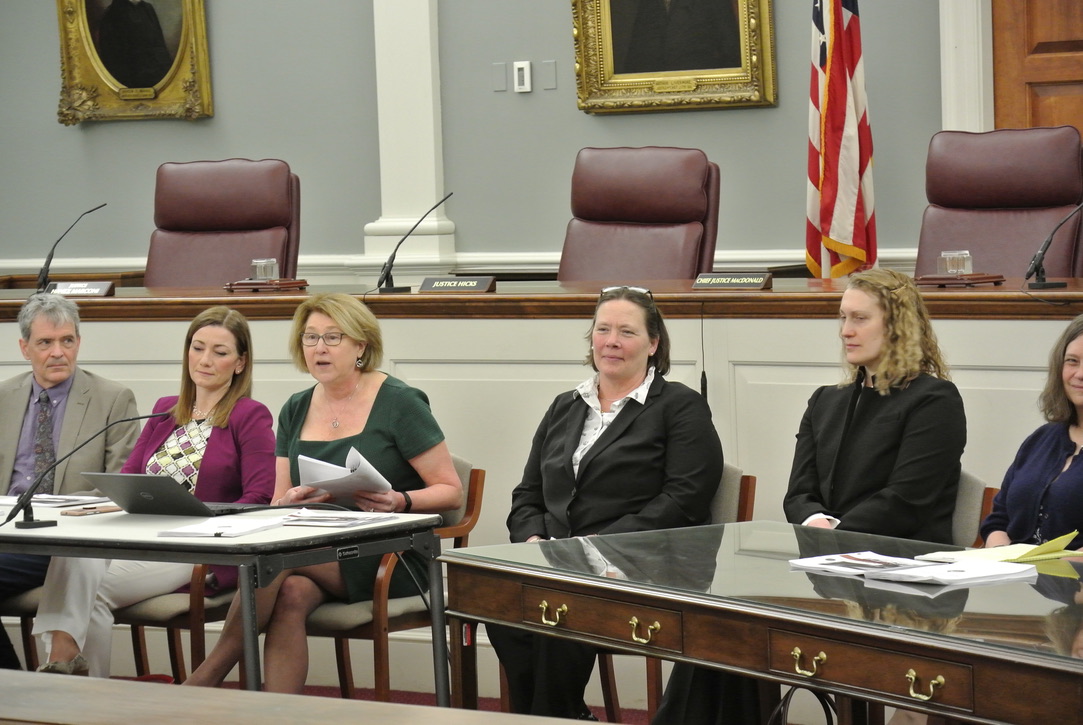Read the full report here: Report of the Task Force of Domestic Violence Cases in the New Hampshire Judicial Branch
By DAMIEN FISHER, InDepthNH.org
CONCORD — The report released Tuesday by the Task Force on Domestic Violence Cases in the New Hampshire Judicial Branch finds there are not enough resources in courts for victims of domestic violence, and there’s a lack of judicial accountability for when things go wrong.
New Hampshire Supreme Court Associate Justice Anna Barbara Hantz Marconi, who chaired the Task Force, said more work is needed, but the report can guide the next steps.
“It’s our hope that this report is a springboard,” she said.
The report was released at the New Hampshire Supreme Court in Concord.
Erica Austin, a domestic abuse survivor who testified before the Task Force, is disappointed in the report.
“It made me sad. I was hopeful there would be something that would come out and really address the issue. I felt it was missing a lot,” she said.
As Austin sees it, the problem with New Hampshire Family Courts is that judges do not follow the law and are not held accountable for their actions.
“I really felt that (the report) was just a deflection of the real issue,” Austin said.
Lyn Schollett, Executive Director of the New Hampshire Coalition Against Domestic and Sexual Violence, said the fact the Task Force was created at all shows that the judiciary is making some progress.
The Task Force brought together members of the public, advocates, attorneys, and judges to examine how the courts deal with domestic violence cases, and what can be done better. Schollett wants to see the judiciary open up more to create better communication between the courts and the public.
“I would hope to see improved communication among the judicial branch and other stakeholders,” she said.
Schollett was a member of the Task Force who pushed to have the group reconvene in six months to review what progress has been made. That’s when the public will know if the work is really being done, she said.
“We’ll see in six months,” she said.
Scott Hampton with Ending The Violence in Dover, who was also a member of the Task Force, said the whole experience has been a wake-up call for him, and others in the field.
“One of the things that we noticed as we did the work, we noticed how we weren’t all working together as much as we needed to,” Hampton said. “There were cracks and gaps in the system.”
Hampton said abusers can exploit those gaps to further their abuse. Getting all of the stakeholders on the same page will lead to better outcomes for the survivors, once the necessary work starts getting done. One of the Task Force recommendations is now to create a standing Domestic Violence Committee in the Judicial Branch to start accomplishing some of the goals.
Hantz Marconi said one of the more contentious issues for the Task Force was creating more accountability for judges. Without endorsing any specific plan to make judges more accountable, she said more could be done. The Task Force recommendation is to seek more public input on judicial accountability.
“More could be done and make courts more accountable and transparent,” she said.
Judges are subject to a performance review once every three years by the Judicial Conduct Committee, and the results of an individual judge’s review are typically not made public.
Chief Justice Gordon MacDonald said the Judicial Branch will consider the Task Force recommendations, and start implementing some of them, including ways to make the courts more transparent.
“We are committed to considering the recommendations and to being transparent about the Judicial Branch’s progress,” he said.
The new standing committee recommended by the Task Force, the Domestic Violence Committee, will be chaired by Dianne Martin, the Director of the Administrative Office of the Courts, and it will report directly to the Supreme Court.
The Task Force was created by MacDonald in the wake of a domestic violence shooting incident that left a Massachusetts woman with severe injuries, the shooter dead, and serious questions about how New Hampshire courts respond to victims of domestic violence.
Richard Lorman, 55, of Wilton, reportedly waited outside of Lindsay Smith’s workplace in Salem, Mass., on Nov. 15, 2021, and shot her in the head when she left work. Smith survived the shooting, but Lorman died at the scene after he shot himself. Smith had previously tried to get a restraining order against Lorman in the 10th Circuit Court – Hampton Family Division, but was denied by Judge Polly Hall.
When it was revealed that Hall denied Smith’s request despite evidence that Lorman was threatening her, the judiciary had an Internal Review Committee investigate that matter. That committee cleared Hall of wrongdoing, but the subsequent public scrutiny resulted in the creation of the Task Force.





